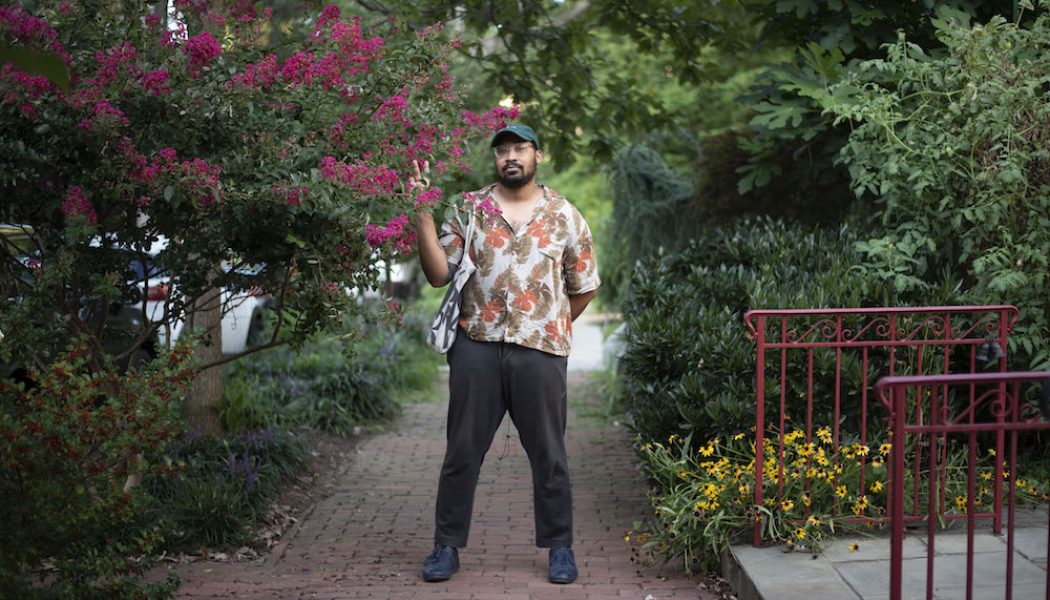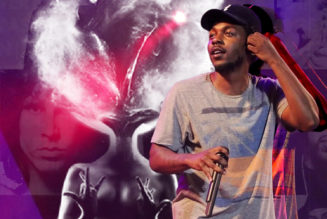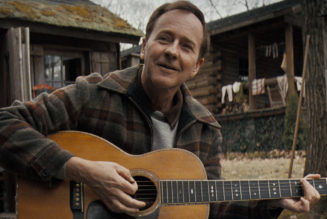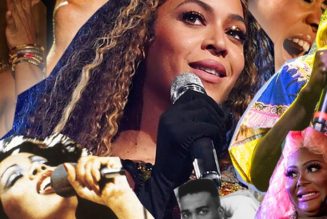
“If I died in a meadow, I don’t think they’d ever find me at all,” Bartees Strange belts on “Stone Meadows,” a cathartic indie-rock centerpiece from his debut LP, Live Forever. It’s a grim thought — but one that often crossed his mind as a young Black person in his native Oklahoma.
“I knew people who died, and no one found them,” he tells SPIN. “I’m Black, and I grew up in the country. And I remember being afraid — if something happens to me, if this cop doesn’t like me, if these boys chasing me home don’t leave me alone, no one’s gonna find me. And it’s like a really dark way to live your life: knowing that, no matter what, no matter how successful you are, how much money you make, how many people know you, you can still literally be disappeared off the face of the Earth. That’s kind of what the song was about.”
Strange (born Bartees Cox Jr.) grew up as a self-described “busy kid.” He bounced around from sport to sport (He later played football, briefly, on scholarship at Emporia State University in Kansas), singing in the church choir multiple days a week with his opera-trained mother. “I think about that a lot,” he says. “I think it’s a black protection thing. [Mustang] was an all-white, super conservative town. My parents were just like, ‘We got to keep these kids busy as hell.’”
After quitting football in college, he focused on songwriting — bouncing around in bands as he moved from Washington D.C. to Brooklyn to D.C. again. All the while, he gathered ideas that were just too weird, too genre-agnostic to fit any particular project. So now, at age 31, he’s finally releasing his first album, which cross-pollinates his major influences — indie-rock, emo, hip-hop, soul, folk, country, blues, prog — in a way that feels genuinely limitless.
The singer-songwriter spoke to SPIN about the insightful themes of Live Forever and the album’s thrilling disregard for stylistic boundaries.
SPIN: The thesis of the entire album seems to arrive on “Mossblerd” — “Genres keep us in our boxes.”
Bartees Strange: That was the last song I wrote on the album, which, I guess is kind of poetic. I remember listening back to the record, like, “I know what I’m trying to say with these songs, but I haven’t really said it at all.” I feel like that song is the catalyst, like, “This what you’re hearing.” “Mossblerd” was the only song I wrote with that much purpose, like, “I need like an edification point on the record.”
The album is so all over the place — there are rap verses, trap beats, indie-rock guitars, samples, horns. How much of that eclecticism was deliberate for you, and how much emerged organically?
It was pretty organic. When I went to record, I invited everyone up to the barn [studio in Wassaic, New York] and was just like, “Yo, I’ve got like 20-ish demos, and I’m gonna find a record in those 20 songs.” Once I recorded a bunch of things, I could see the record. I’ll be honest — I was pretty intimidated by the sounds because I’d never heard anything like it. I was very jarred by it. It’s something I’ve always wanted to make, but I’d never made anything [by] just trusting my gut. I feel like my life’s challenge has been, like, writing hardcore songs with rap verses or country parts or solos that were obviously blues-inspired. [Laughs] Always having to walk things back, like, “No one’s gonna focus on that — I need to make it just a rock song or just a country song” or whatever. This time, I was like, “I can do whatever I want. It’s mine.”
There were songs I didn’t want to record, like “Boomer.” I feel like [it’s] bringing the north and the south together. [Laughs] It starts off like Da Baby, and it ends in, like, a George Strait breakdown. When I wrote it, I was just like, “This feels good.” And when I heard it, I was like, “Oh, man, no white person — no one’s gonna like this.” But then we played it a couple times live, and people loved it. I was like, “Man, I was fuckin’ right.” That’s the point of the record: just go with it. Things are changing; genre lines are blurring. I’ve felt this record for a long time, and I was really happy to pour all of myself into it without being afraid of how it would be received.
“Boomer” is such a heavyweight track. I love the line where you talk about smoking with your dad.
I felt like my whole life I was always trying to run away from where I grew up. It was traumatic and intense and heavy. I was like, “I need to get out of Oklahoma, move to the east coast, play in bands and forget about this part of my life.” As I got older, I realized that where I’m from and what I’ve seen is what makes me different. I needed to lean into it. “Boomer” is where all of those things meet. I was living in Brooklyn. It was the first time I’d lived in a community that looked like me and I could live freely, and I felt like I was booming. And that’s what that song is about: My dad being like, “Yo, I’m proud of you for doing the thing you wanted to do.” My whole life, I was always trying to fit in and keep my head down. But once I was out of that space, I felt like I could be myself and not hold back.
You tap into some seriously dark subject matter on “Mustang.”
I’ve always dealt with a weird survivor’s guilt, just getting out of where I was. A lot of my friends have passed away, and I’ve always joked that I’m cursed. Next door [to my work] there was this really sweet couple who ran a business. I talked to them every morning, and one day they jumped out of their building and killed themselves. I wrote a lot of this song the day after. The first words of “Mustang” are, “A man fell out this morning / I’m the antecedent,” and it’s like, “It’s my fault. I talked to them, and they died.” I take blame for so many things I have no control over. Despite everything, I still have to keep on pushing. Hopefully I made the last part sound kind of aspirational — there’s a future here for this person.
Did recording this album help you process your own past? You now feel comfortable with Oklahoma being a part of your identity, but you also experienced a lot of hate back then.
That’s gonna be a lifelong journey. I’m probably always gonna be dealing with something that I or my parents or brother or sister experienced. But in that trauma, in that struggle, is a lot of beauty. Because I got through those times and became a decent, productive person who’s not full of hate, I’ve accomplished a lot already. I have to remind myself of that — I’m lucky. And because of where I’m from, I owe people. I’m not telling these stories just for me — I’m doing it for everybody back home. I hope that when there’s like a Black kid in Del City [Oklahoma] who picks up a guitar, they’re like, “Hell yeah — Bartees played football with my cousin, and he got out and is doing what he wants to do, and I’m gonna do that.” That’s what keeps me going. I believe my journey in making this record was coming to grips with who I am and where I’m from and what I represent.










